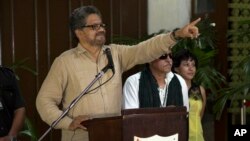Four countries sponsoring the Colombian peace process called Tuesday for an "urgent de-escalation" of battlefield violence that has threatened to derail talks in Cuba between the government and leftist rebels.
"We urge the parties to strictly restrict any actions that cause victims or suffering in Colombia, and to step up the implementation of confidence-building measures," said the statement by Norway, Cuba, Chile and Venezuela. "We consider these steps essential."
The Colombian government's top negotiator has threatened to walk away from peace talks with the Revolutionary Armed Forces of Colombia (FARC) as a result of the recent intensification of the war.
For its part, FARC has been advocating a bilateral cease-fire, which the government has rejected based on previous attempts when the FARC used truces to rearm.
Latin America's longest war has killed 220,000 people and displaced millions since 1964. The Havana talks have produced the most progress to date toward ending the conflict.
In March, Colombian President Juan Manuel Santos agreed to halt aerial bombing in recognition of a unilateral cease-fire called by FARC at Christmas time.
But progress toward peace stopped in April when violence broke out anew. Santos ordered a resumption of air assaults in response to a rebel attack that killed 10 soldiers.
Since then, both sides have carried out more attacks, with FARC formally renewing offensive operations and sabotaging roads, pipelines and utilities.
Chief rebel negotiator Ivan Marquez attempted to downplay the remarks over the weekend by lead government negotiator Humberto de la Calle, who said peace talks had hit a low point and noted they were unpopular with skeptical Colombians. Public support is important since the voters would have to ratify the text of any final agreement.
"We don't have to give any space to ominous voices about the failure of the talks, nor to over-the-top statements from those who have in their hands the sacred responsibility to build peace," Marquez said.
However, Marquez himself warned on June 23 that escalating violence could damage the talks.
Since starting talks in November 2012, government and rebel negotiators have reached partial accords on three of five agenda points: land reform, the political future of FARC and an end to illegal drug trade. Still under discussion are victim reparations and FARC's demobilization.





